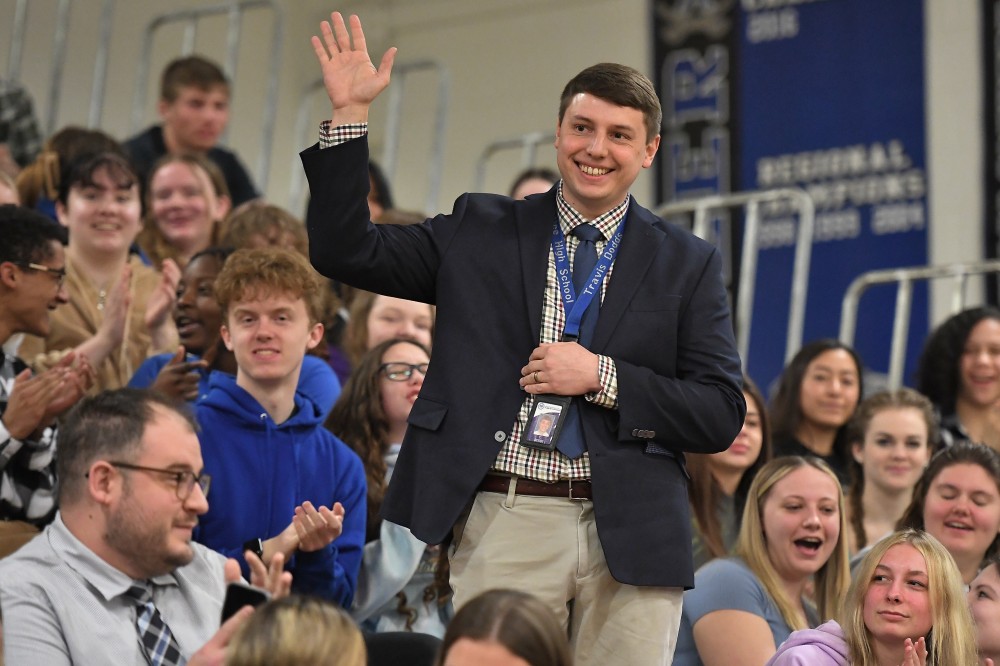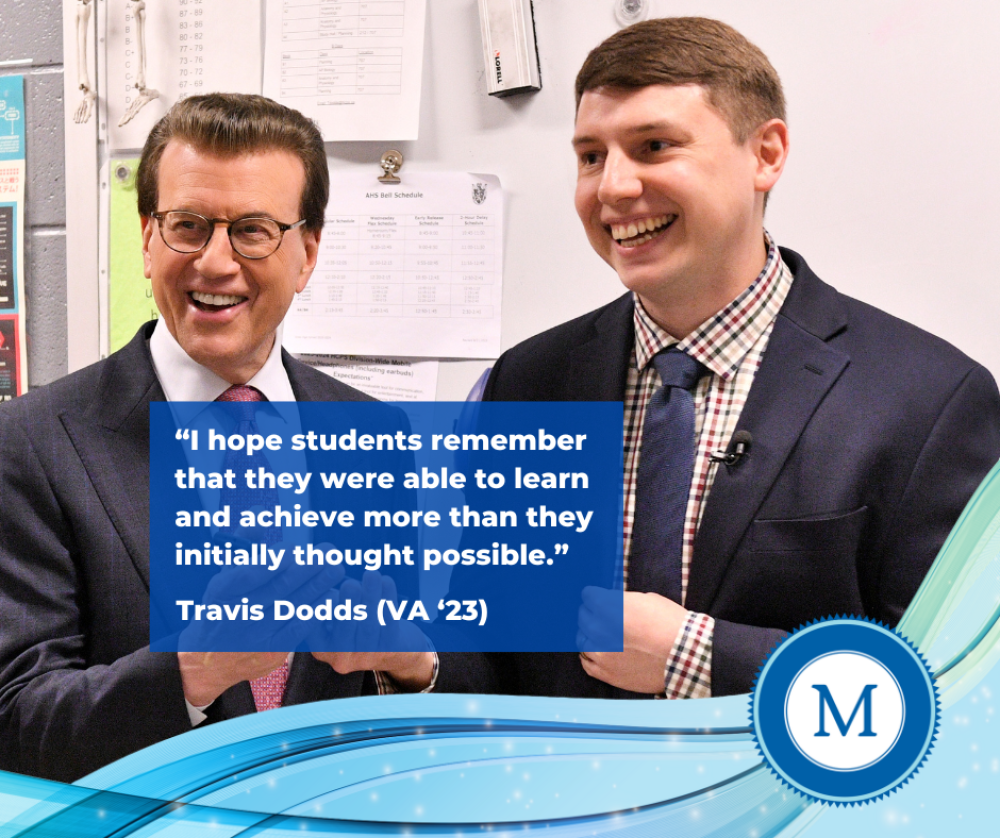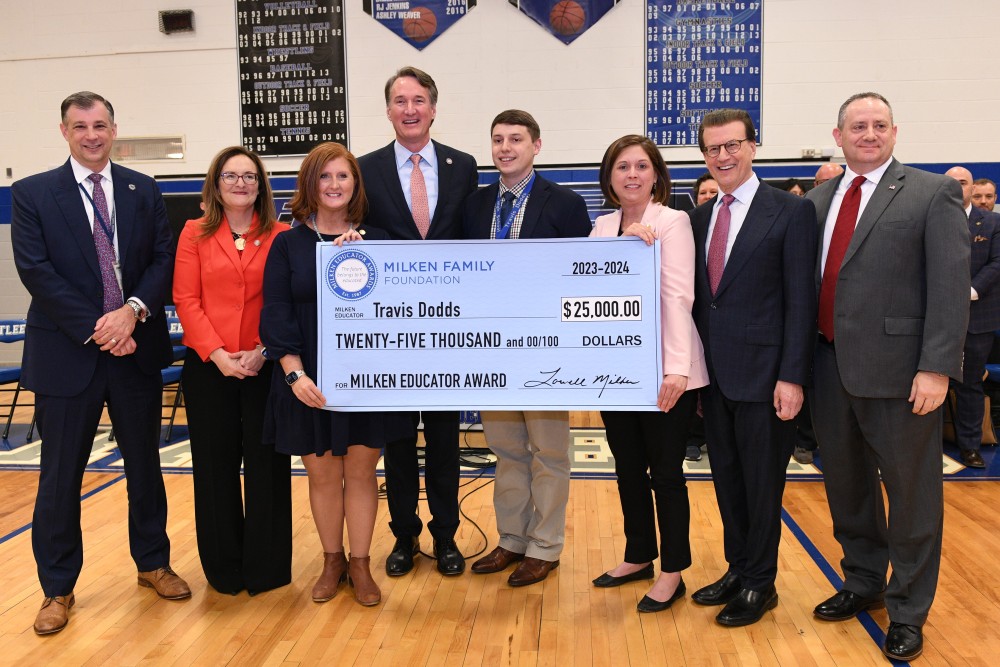Spotlight: Travis Dodds (VA '23)
August 15, 2024
Raised by former educators, Virginia Milken Educator Travis Dodds’ early exposure to the realities of the career helped guide him to the classroom. Now a science teacher at his alma mater, he connects with students while being reminded of the joys, challenges and various mindsets high school students have. Using case studies, Travis helps students find relevancy and interest in their learning. “I hope students remember that they were able to learn and achieve more than they initially thought possible. While it would certainly be great if students remembered all of the content 10 years later, ultimately, it’s the skills they develop and ability to persevere that will help them the most.” Travis received a 2023-24 Virginia Milken Educator Award in Mechanicsville on March 19, 2024.
Milken Family Foundation: How have students responded since your Milken Educator Award surprise?
Travis Dodds (VA '23): Students have had a very positive response! The number of students that have congratulated me has been incredible. Hearing from my own students that they felt I deserved the award has been the most rewarding aspect of this whole thing.
MFF: Who are your role models as an educator?
Dodds: I don’t know of any one experience that shaped my practices and motivations, but I would say that growing up in a household of educators and having overall positive educational experiences helped shape my outlook on teaching. Having educator parents, I had realistic expectations of what the career looked like both in the building and outside of the classroom. I had great teachers throughout my public education and always enjoyed being in school.

MFF: Tell us about your first year of teaching.
Dodds: My first year of teaching was intense. I accepted a part-time position teaching two sections of anatomy at my old high school while I tried to figure out what I wanted to do with my life. After my first week in the classroom, I knew I wanted to pursue teaching and enrolled in a career switcher program at the University of Richmond. For the first semester, I taught my classes during the day, then took my own education classes at night. It was a lot of work, but I believe it made me a stronger teacher in the long run as I was able to immediately apply what I was learning in class to my own classroom the very next day. The second semester, I continued taking night classes and teaching part time, but also student taught during my off blocks. I had an amazing mentor teacher, Mrs. Trickett, who was actually my biology teacher as a freshman in high school. I think the combination of great mentors, teachers, and support from my school administration as well as my professors at the University of Richmond helped me stay motivated through that first year and set a strong educational foundation for me as a teacher.
MFF: What do you hope students remember from their time with you?
Dodds: I hope students remember that they were able to learn and achieve more than they initially thought possible. One of my favorite things to hear from students at the end of the year is, “I didn’t think I would like this class at the beginning of the year, but I actually learned a lot this year.” While it would certainly be great if students remembered all of the content 10 years later, ultimately, it’s the skills they develop and ability to persevere that will help them the most.

MFF: Could you share some examples of the thought behind the real-world approaches you use to teach biology, anatomy, and physiology? What strategies do you think make the biggest difference in engaging students and enhancing their understanding of scientific concepts?
Dodds: I believe students can and will learn anything they find relevant and interesting, so one of my strategies is to use case studies in teaching life sciences. Case studies help students make their learning relevant and interesting, but also require students to use the information learned in class and form new ideas based on their learning. If you can transfer and apply the information in a practical setting, then you know the concepts.
MFF: How has being an alumna of AHS influenced your approach to teaching and your connection with students?
Dodds: I think teaching at my alma mater has helped me remember what it was like being a high school student. When I walk around the building and see my former teachers, I can remember sitting in their classes and what made being in their classes great. It also helps keep me grounded to some of the challenges, joys, and overall mindsets my students have coming into the building.
MFF: What advice would you share with people who are interested in becoming teachers?
Dodds: I would encourage anyone interested in becoming a teacher to try it out by substitute teaching. There is no better way to learn if something is a good fit than by diving in and trying it out.
Watch our interview with Travis Dodds (VA '23) on the day of his Milken Award notification:
Don’t miss any new articles and updates from Milken Educator Awards:


